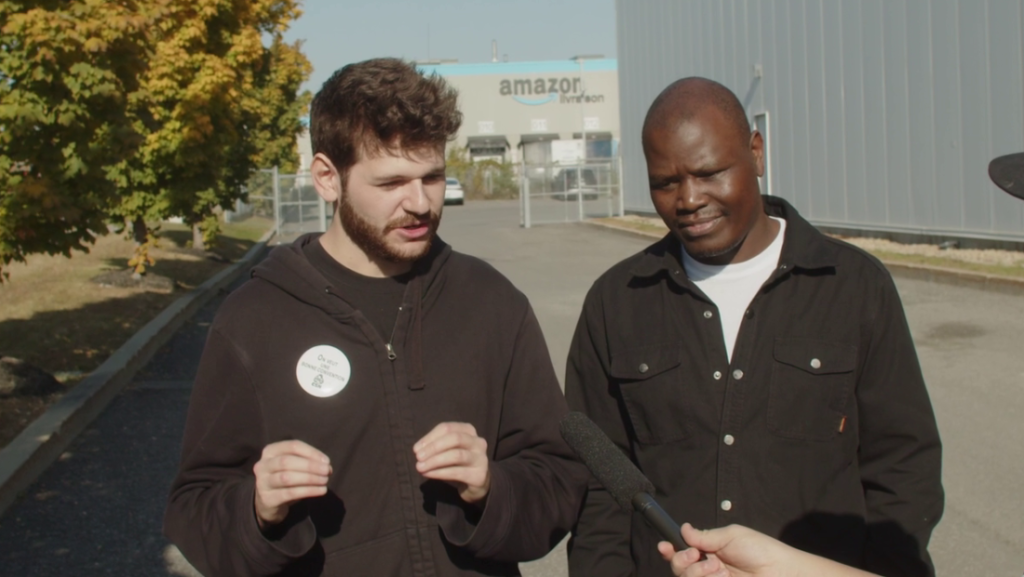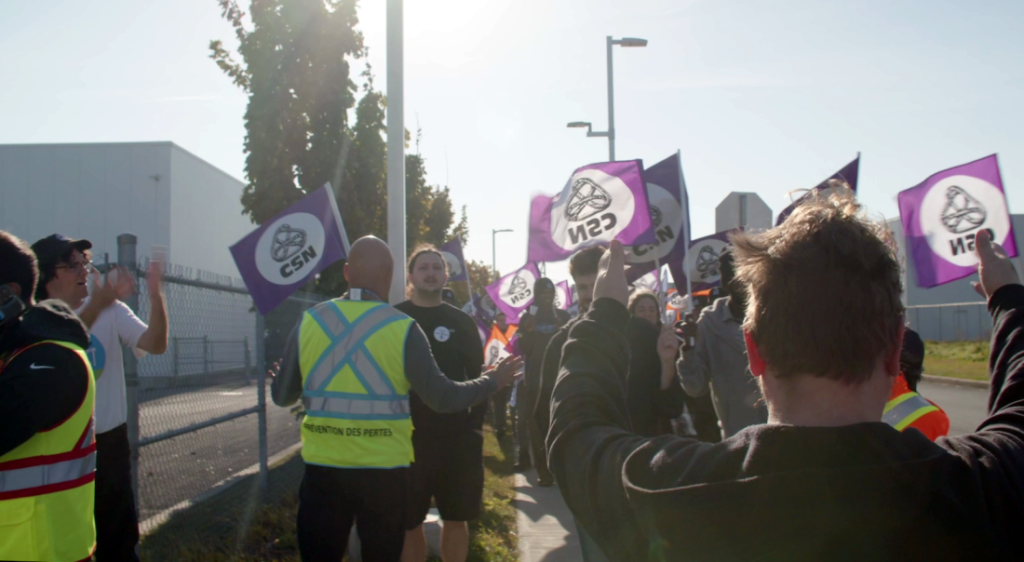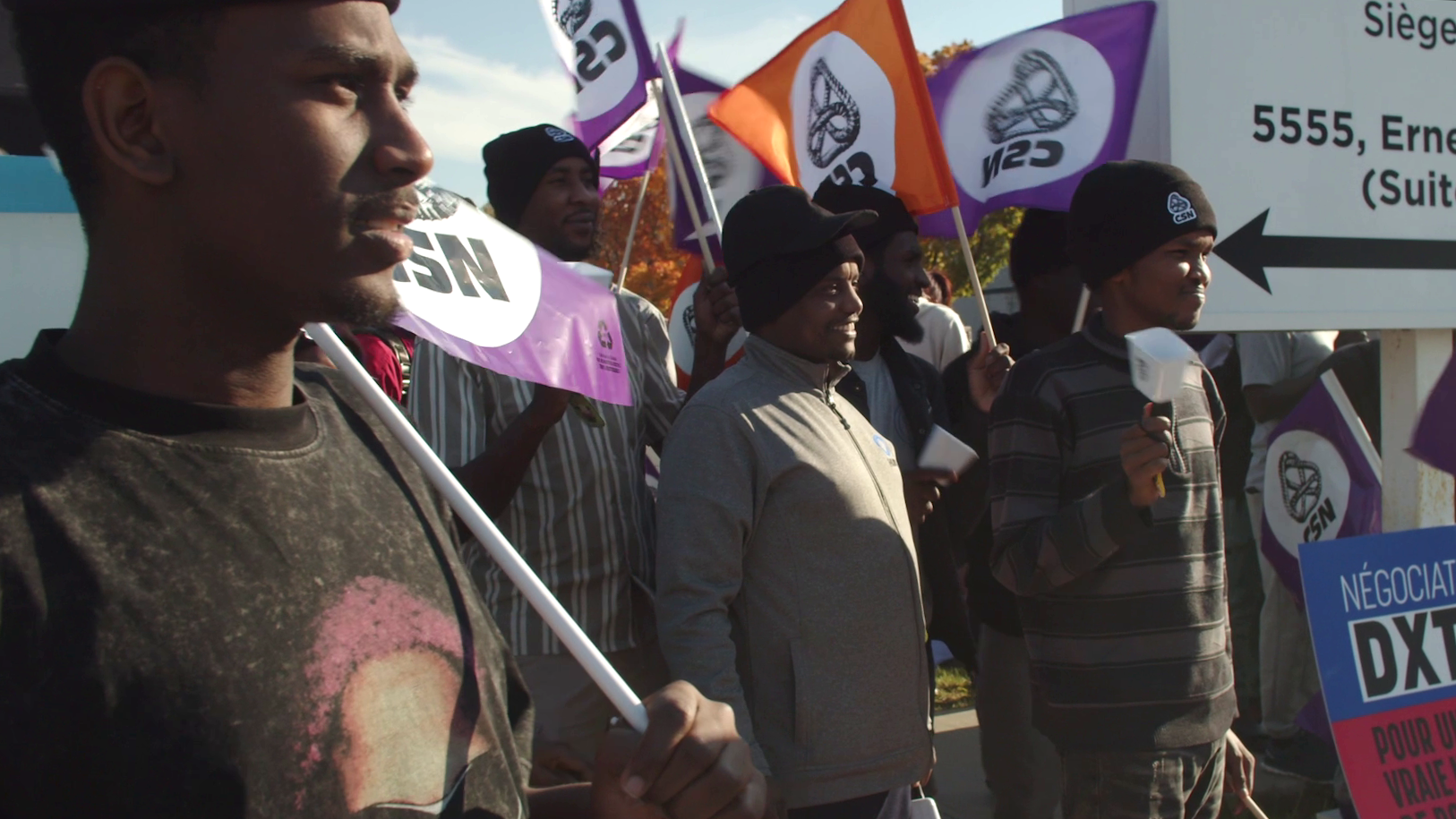This morning, around 50 Amazon workers demonstrated outside the DXT4 warehouse in Laval. For them, it was a new escalation in their negotiations following the formation of the retail giant’s first union in Canada. They are demanding that Amazon stop sabotaging negotiations.
“We want things to move forward in line with our demands, which are very reasonable,” explains Félix Trudeau, President of the Syndicat des Travailleurs et Travailleuses d’Amazon Laval (STTAL-CSN). He adds that the monopolist company is trying to buy time and break their morale.
“Amazon is intentionally slow in making proposals to us,” he continues. “And what they bring us doesn’t even respect the status quo. What Amazon wants is to be able to change everything whenever it wants. That’s not acceptable to us, that’s not why we joined the union.”
“Our demands reflect the extent to which we are essential to the company, the extent to which our work is what keeps Amazon running,” insists the president of the warehouse workers’ union.
In the spring of 2024, workers at the Laval warehouse made history by becoming the first Amazon employees in Canada to unionize. Since then, STTAL-CSN members have been mobilizing to become the first to obtain a collective agreement in the history of the multinational.
The demonstration is taking place in a context where, in mid-October, the stalled negotiations prompted warehouse workers to vote unanimously in favour of pressure tactics to denounce their bosses’ intransigence.

A first show of force
The workers gathered at around 9.45am on the corner of Ernest-Cormier and Maurice-Cullen. They then marched towards the entrance to the warehouse, overtaking the panicked managers who tried in vain to stop them.
For a few minutes, the fifty or so workers shouted and made noise in front of the entrance to express their discontent. The atmosphere was festive, and the union members seemed more motivated than ever to fight for their conditions. They then returned to their starting point to make themselves visible to passers-by.
For Trudeau, “Amazon can try to divide us and intimidate us, but we’re not going to be impressed. We know what’s good for us. I think we saw it this morning, people are encouraged, they’re ready to mobilize.”
A blatant example of these divisive tactics occurred last month. Amazon gave a pay rise to all workers in the Montreal region, except those at DXT4, “regardless of the fact that we are all equal, doing the same work,” explains Hillary Kibos, a worker at DXT4.

“We’re just asking for the minimum”
The workers’ demands relate in particular to pay, wokrplace health and safety and job security. Mr Kibos insists: “We’re just asking for the minimum”.
He explains, for example, that the union is asking for clear hiring and firing standards. Recently, Amazon terminated the contract of 15 workers without giving any reason:
“They were good at their work. Because they are our colleagues, we have seen how they work, but they were still cut. Now, those are the things that we would like Amazon to say clearly: set the standards of employment.”
What’s more, the number of injuries is much higher than the norm. Kibos says that 126 injuries have been recorded since the start of the year, which works out to about 3 injuries a week.

Yet in their press releases, Amazon bosses seem proud of their health and safety policies. Amazon Canada stated, in October 2023, “The safety and health of our employees remains a top priority, and we are pleased with our progress.”
In contrast, Trudeau said that “accidents happen because people feel rushed, because there’s a rhythm imposed by the machine. The conveyor belt runs, the alarms go off. Then there are the managers who put the pressure on.”
According to a survey by the Immigrant Workers Centre (IWC), 69.7% of Amazon workers say that the risk of suffering an accident at work is very high. What’s more, 66.6% think it’s only a matter of time before their health situation forces them to take a leave of absence or quit their job.
The STTAL president believes that workers know “what they have to do to work safely. What we want are the tools in the agreement to give workers the power to reduce injuries and to work safely.”

That’s why the workers have joined a union, he says. “Unions are democracy for workers, in their workplaces. It’s the best tool we have to change that system. The problems at Amazon are not just the managers on the floor, it’s not just the small policies.”
In a speech to the demonstrators, the CSN reiterated its intention to extend its unionisation efforts to other warehouses in Montreal.
On this subject, Trudeau said: “My message to workers who want to unionise is to trust each other. Talk to your colleagues about the problems you are experiencing at work. Talk about the solutions you can provide.”

